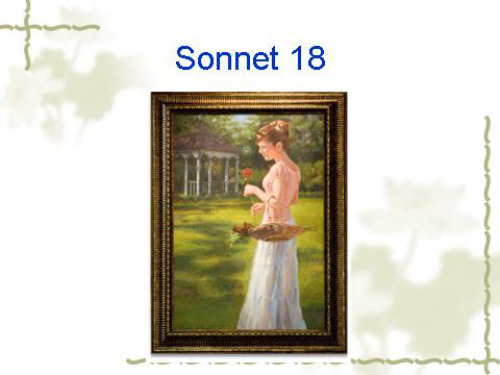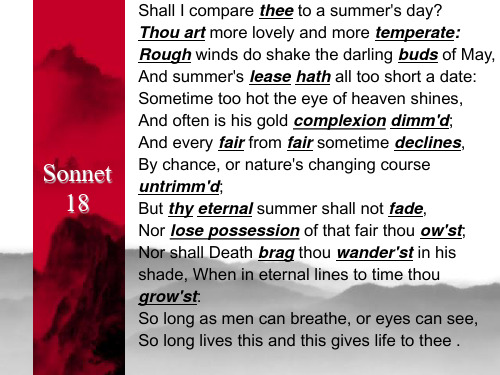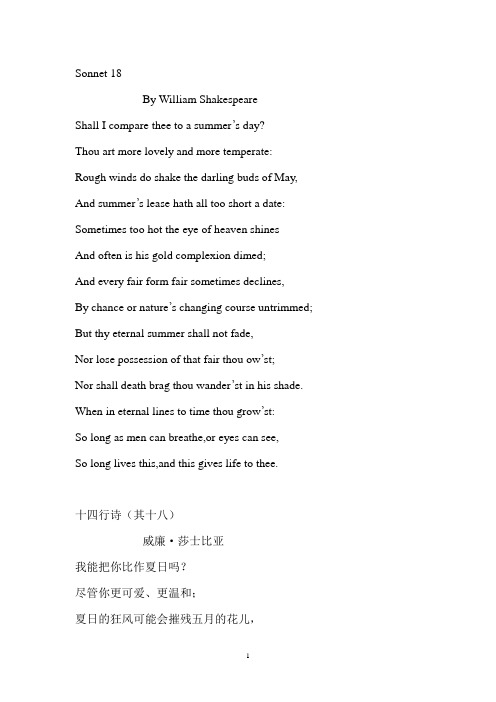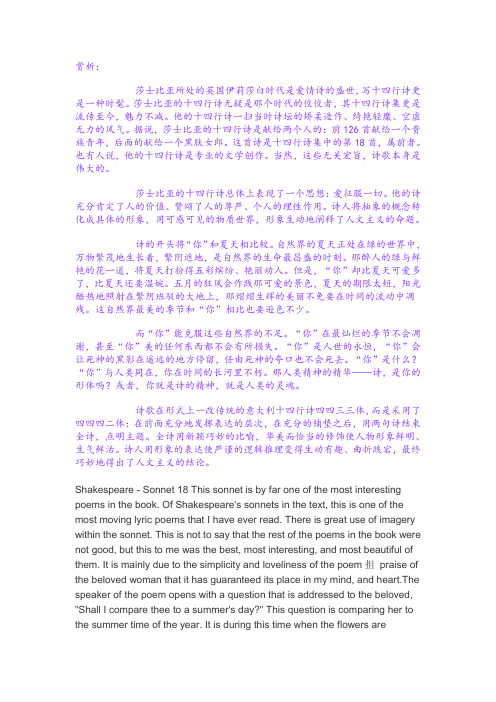英国文学8.2 讲解Sonnet 18
专八英国文学 莎士比亚 sonnet18上课讲义

Eluciddation ( 承c )
By chance, or nature’s changing course, untrimm’d. d
But thy eternal summer shall not fade, Nor lose possession of that fair thou ow’st, Nor shall Death brag thou wander’st in his shade, When in eternal lines to time thou grow’st.
a
Thou art more lovely and more temperate.
b
Rough winds do shake the darling buds of may,
a
And summer’s lease hath all too short a date.
b
Sometime too hot the eye of heaven shines,
Types of Sonnet
• There are three dominant types of sonnet, all named after their founders or perfecters(完善者): Petrarchan sonnet, Spenserian sonnet and Shakespearean sonnet.
• What figures of speech are used in this poem? • What is the theme of the poem?
And sum mer’s lease hath all too short a date. b
英国文学Sonnet 18 难词解析

Thee [ði] ---You(宾格) 你 Thou [ðaʊ] ---You(主格)] 你,尔,汝 Thy [ðaɪ] ---Your 你的(thou的所有格) Art [ɑrt] ---Are Hath[hæθ] ---Has Ow’st---Own Wander’st---Wander Grow’st---Grow Dimm'd---Dimmed Untrimm'd---Untrimmed Examples: I shall but love thee better after death. 倘若上帝恩许,我死后将更加爱你。 Solve thou my secrets. 解答你我的秘密。
Translation
But thy eternal summer shall not fade, œ 你 久 决 会 枯, Nor lose possession of that fair thou ow'st; 你 远 会 去你 仪态; Nor shall Death brag thou wander'st in his shade, >!˛ 你 踯 , When in eternal lines to time thou grow'st: 你将 诗 与时间 ; So long as men can breathe, or eyes can see, YV 类 , 看 见, So long lives this and this gives life to thee . G 这诗 , 你 绵 。
Translation
让 来 你 拟 ? 你可 更加温 ,更加可爱: 狂风会 开 儿, 季 结 : 时 苍 巨 热, 脸 会 ; 样 ,总会 开 , 时机 谢 残; 你 久 决 会 枯, 你 远 会 去你 仪态; 你 踯 , 你将 诗 与时间 ; 类 , 看 见, 这诗 , 你 绵 。
完整word版,Sonnet18(英文赏析)

Sonnet 18By William ShakespeareShall I compare thee to a summer’s day?Thou art more lovely and more temperate: Rough winds do shake the darling buds of May, And summer’s lease hath all too short a date: Sometimes too hot the eye of heaven shinesAnd often is his gold complexion dimed;And every fair form fair sometimes declines,By chance or nature’s changing course untrimmed; But thy eternal summer shall not fade,Nor lose possession of that fair thou ow’st;Nor shall death brag thou wander’st in his shade. When in eternal lines to time thou grow’st:So long as men can breathe,or eyes can see,So long lives this,and this gives life to thee.十四行诗(其十八)威廉·莎士比亚我能把你比作夏日吗?尽管你更可爱、更温和;夏日的狂风可能会摧残五月的花儿,季节的限制又减少了可拥有的日光;天空的巨眼有时过于灼热,常使自身的辉煌无故湮没;每一种美都会消逝,不管愿意或是无奈;然而你这盛夏将永存不朽,连你所有的美都不会褪去;死神不忍逼近,生命只会长存;只要人类能呼吸,能看见;我的诗就会存在,而你的生命也会延续。
Sonnet18赏析

赏析:莎士比亚所处的英国伊莉莎白时代是爱情诗的盛世,写十四行诗更是一种时髦。
莎士比亚的十四行诗无疑是那个时代的佼佼者,其十四行诗集更是流传至今,魅力不减。
他的十四行诗一扫当时诗坛的矫柔造作、绮艳轻糜、空虚无力的风气。
据说,莎士比亚的十四行诗是献给两个人的:前126首献给一个贵族青年,后面的献给一个黑肤女郎。
这首诗是十四行诗集中的第18首,属前者。
也有人说,他的十四行诗是专业的文学创作。
当然,这些无关宏旨,诗歌本身是伟大的。
莎士比亚的十四行诗总体上表现了一个思想:爱征服一切。
他的诗充分肯定了人的价值、赞颂了人的尊严、个人的理性作用。
诗人将抽象的概念转化成具体的形象,用可感可见的物质世界,形象生动地阐释了人文主义的命题。
诗的开头将“你”和夏天相比较。
自然界的夏天正处在绿的世界中,万物繁茂地生长着,繁阴遮地,是自然界的生命最昌盛的时刻。
那醉人的绿与鲜艳的花一道,将夏天打扮得五彩缤纷、艳丽动人。
但是,“你”却比夏天可爱多了,比夏天还要温婉。
五月的狂风会作践那可爱的景色,夏天的期限太短,阳光酷热地照射在繁阴班驳的大地上,那熠熠生辉的美丽不免要在时间的流动中凋残。
这自然界最美的季节和“你”相比也要逊色不少。
而“你”能克服这些自然界的不足。
“你”在最灿烂的季节不会凋谢,甚至“你”美的任何东西都不会有所损失。
“你”是人世的永恒,“你”会让死神的黑影在遥远的地方停留,任由死神的夸口也不会死去。
“你”是什么“你”与人类同在,你在时间的长河里不朽。
那人类精神的精华——诗,是你的形体吗或者,你就是诗的精神,就是人类的灵魂。
诗歌在形式上一改传统的意大利十四行诗四四三三体,而是采用了四四四二体:在前面充分地发挥表达的层次,在充分的铺垫之后,用两句诗结束全诗,点明主题。
全诗用新颖巧妙的比喻,华美而恰当的修饰使人物形象鲜明、生气鲜活。
诗人用形象的表达使严谨的逻辑推理变得生动有趣、曲折跌宕,最终巧妙地得出了人文主义的结论。
Shakespeare - Sonnet 18 This sonnet is by far one of the most interesting poems in the book. Of Shakespeare's sonnets in the text, this is one of the most moving lyric poems that I have ever read. There is great use of imagery within the sonnet. This is not to say that the rest of the poems in the book were not good, but this to me was the best, most interesting, and most beautiful of them. It is mainly due to the simplicity and loveliness of the poem抯praise of the beloved woman that it has guaranteed its place in my mind, and speaker of the poem opens with a question that is addressed to the beloved, "Shall I compare thee to a summer's day" This question is comparing her to the summer time of the year. It is during this time when the flowers are blooming, trees are full of leaves, the weather is warm, and it is generally thought of as an enjoyable time during the year. The following eleven lines in the poem are also dedicated to similar comparisons between the beloved and summer days. In lines 2 and 3, the speaker explains what mainly separates the young woman from the summer's day: she is "more lovely and more temperate." (Line 2) Summer's days tend toward extremes: they are sometimes shaken by "rough winds" (line3) which happens and is not always as welcoming as the woman. However in line 4, the speaker gives the feeling again that the summer months are often to short by saying, "And summer抯lease hath too short a date." In the summer days, the sun, "the eye of heaven" (line 5), often shines "too hot," or too dim, "his gold complexion dimmed" (line 6), that is there are many hot days during the summer but soon the sun begins to set earlier at night because autumn is approaching. Summer is moving along too quickly for the speaker, its time here needs to be longer, and it also means that the chilling of autumn is coming upon us because the flowers will soon be withering, as "every fair from fair sometime declines." (Line 7) The final portion of the sonnet tells how the beloved differs from the summer in various respects. Her beauty will be one that lasts forever, "Thy eternal summer shall not fade." (Line 9), and never end or die. In the couplet at the bottom, the speaker explains how that the beloved's beauty will accomplish this everlasting life unlike a summer. And it is because her beauty is kept alive in this poem, which will last forever. It will live "as long as men can breathe or eyes can see." (Line 13)On the surface, the poem is on the surface simply a statement of praise about the beauty ofthe beloved woman and perhaps summer to the speaker is sometimes too unpleasant with the extremes of windiness and heat that go along with it. However, the beloved in the poem is always mild and temperate by her nature and nothing at all like the summer. It is incidentally brought to life as being described as the "eye of heaven" with its "gold complexion". The imagery throughout the sonnet is simple and attainable to the reader, which is a key factor in understanding the poem. Then the speaker begins to describe the summer again with the "darling buds of May" giving way to the " summer抯lease", springtime moving into the warmth of the summer. The speaker then starts to promise to talk about this beloved, that is so great and awing that she is to live forever in this sonnet. The beloved is so great that the speaker will even go as far as to say that, "So long as men breathe, or eyes can see," the woman will live. The language is almost too simple when comparing it to the rest of Shakespeare抯sonnets; it is not heavy with alliteration or verse, and nearly every line is its own self-contained clause, almost every line ends with some punctuation that effects a pause. But it is this that makes Sonnet18 stand out for the rest in the book. It is much more attainable to understand and it allows for the reader to fully understand how great this beloved truly is because she may live forever in it. An important theme of the sonnet, as it is an important theme throughout much of the poetry in general, is the power of the speaker's poem to defy time and last forever. And so by doing this it is then carrying the beauty of the beloved down to future generations and eventually for al of eternity. The beloved's "eternal summer" shall not fade precisely because it is embodied in the sonnet: "So long as men can breathe or eyes can see," (line 13) the speaker writes in the couplet, "So long lives this, and this gives life to thee."(Line 14) With this the speaker is able to accomplish what many have done in poetry and that is to give the gift of an eternal life to someone that they believe is special and outshines everyone else around them. Perhaps it is because of a physical beauty that the speaker see, but I believe that it is more because of the internal beauty as seen in line 2, "Thou art more lovely and more temperate", that the beloved is deserving to live on forever.。
专八英国文学莎士比亚sonnet18

韵律与节奏:诗歌的韵律和 节奏与诗人的情感相呼应, 增强了诗歌的音乐性和美感
文字解读:通过对诗歌中文 字的解读,深入理解诗人的
思想和情感
莎士比亚Sonnet 18的启示和意义
对人生的启示
珍惜生命:莎士比 亚Sonnet 18表达 了对生命的热爱和 珍视,启示我们要 珍惜每一天,活在 当下。
追求真爱:诗中表 达了对真爱的执着 追求,启示我们要 勇敢地追求真爱, 不要被世俗的束缚 所束缚。
专八英国文学莎 YOUR LOGO 士比亚Sonnet
18
,a click to unlimited possibilities
汇报人:
汇报时间:20X-XX-XX
添加目录标题
莎士比亚 Sonnet 18的解
读和分析
莎士比亚 Sonnet
示和意义
莎士比亚 Sonnet 18的文
莎士比亚Sonnet 18的鉴赏和评价
文学鉴赏的角度和方法
主题和象征:分析Sonnet 18的主题, 探讨其中使用的象征手法及其意义
语言和修辞:鉴赏莎士比亚的语言艺 术,分析他使用的修辞手法,如隐喻、 明喻、拟人等
情感和共鸣:探讨Sonnet 18所表达 的情感,以及读者如何与诗歌产生共鸣
文化和历史背景:分析莎士比亚所处 时代的社会和文化背景,以及这些背 景如何影响他的创作
文学价值:莎士 比亚Sonnet 18作为经典文 学作品,具有极 高的文学价值和 艺术成就
对后世的启示: 莎士比亚 Sonnet 18对 后世的文学创作 产生了深远的影 响,为后来的文 学作品提供了借 鉴和启示
对语言艺术的启示
运用比喻和象征手法,使诗歌更具表现力和感染力 运用押韵和节奏,使诗歌更具音乐性和美感 运用丰富的词汇和句式,使诗歌更具多样性和变化性 通过对自然景物的描写,表达对生命和爱情的思考与感悟
英国文学之十四行诗第18首Sonnet18

Imagery
Imagery refers to the sensory images produced by words. Imagery is the life of a good poem. Imagery is divided into visual image, auditory image, olfactory image(嗅觉), tactile image (触觉), gustatory image(味觉), kinaesthetic image (动觉), abstract image, etc.
The moan of doves in immemorial elms. And murmuring of innumerable bees.
—A. Tennyson, Princes.
Assonance: a repetition of the same or similar vowel sounds,
(Anapestic Trimeter:Down to the depths of the sea)
D. Iambic Tetrameter:Row, brother, row , the stream is fast… (Trochaic Tetrameter:Life is real! Life is earnest!) (Amphibrach Tetrameter : A farmer went trotting upon his grey mare) E. Iambic Pentameter:Farewell, the tranquil mind, farewell, content!
usually close together quite in rhyme. e.g. 1) The waves came over the broken ship
Sonnet18赏析

赏析:莎士比亚所处的英国伊莉莎白时代是爱情诗的盛世,写十四行诗更是一种时髦。
莎士比亚的十四行诗无疑是那个时代的佼佼者,其十四行诗集更是流传至今,魅力不减。
他的十四行诗一扫当时诗坛的矫柔造作、绮艳轻糜、空虚无力的风气。
据说,莎士比亚的十四行诗是献给两个人的:前126首献给一个贵族青年,后面的献给一个黑肤女郎。
这首诗是十四行诗集中的第18首,属前者。
也有人说,他的十四行诗是专业的文学创作。
当然,这些无关宏旨,诗歌本身是伟大的。
莎士比亚的十四行诗总体上表现了一个思想:爱征服一切。
他的诗充分肯定了人的价值、赞颂了人的尊严、个人的理性作用。
诗人将抽象的概念转化成具体的形象,用可感可见的物质世界,形象生动地阐释了人文主义的命题。
诗的开头将“你”和夏天相比较。
自然界的夏天正处在绿的世界中,万物繁茂地生长着,繁阴遮地,是自然界的生命最昌盛的时刻。
那醉人的绿与鲜艳的花一道,将夏天打扮得五彩缤纷、艳丽动人。
但是,“你”却比夏天可爱多了,比夏天还要温婉。
五月的狂风会作践那可爱的景色,夏天的期限太短,阳光酷热地照射在繁阴班驳的大地上,那熠熠生辉的美丽不免要在时间的流动中凋残。
这自然界最美的季节和“你”相比也要逊色不少。
而“你”能克服这些自然界的不足。
“你”在最灿烂的季节不会凋谢,甚至“你”美的任何东西都不会有所损失。
“你”是人世的永恒,“你”会让死神的黑影在遥远的地方停留,任由死神的夸口也不会死去。
“你”是什么?“你”与人类同在,你在时间的长河里不朽。
那人类精神的精华——诗,是你的形体吗?或者,你就是诗的精神,就是人类的灵魂。
诗歌在形式上一改传统的意大利十四行诗四四三三体,而是采用了四四四二体:在前面充分地发挥表达的层次,在充分的铺垫之后,用两句诗结束全诗,点明主题。
全诗用新颖巧妙的比喻,华美而恰当的修饰使人物形象鲜明、生气鲜活。
诗人用形象的表达使严谨的逻辑推理变得生动有趣、曲折跌宕,最终巧妙地得出了人文主义的结论。
Shakespeare - Sonnet 18 This sonnet is by far one of the most interesting poems in the book. Of Shakespeare's sonnets in the text, this is one of the most moving lyric poems that I have ever read. There is great use of imagery within the sonnet. This is not to say that the rest of the poems in the book were not good, but this to me was the best, most interesting, and most beautiful of them. It is mainly due to the simplicity and loveliness of the poem抯praise of the beloved woman that it has guaranteed its place in my mind, and heart.The speaker of the poem opens with a question that is addressed to the beloved, "Shall I compare thee to a summer's day?" This question is comparing her to the summer time of the year. It is during this time when the flowers areblooming, trees are full of leaves, the weather is warm, and it is generally thought of as an enjoyable time during the year. The following eleven lines in the poem are also dedicated to similar comparisons between the beloved and summer days. In lines 2 and 3, the speaker explains what mainly separates the young woman from the summer's day: she is "more lovely and more temperate." (Line 2) Summer's days tend toward extremes: they are sometimes shaken by "rough winds" (line3) which happens and is not always as welcoming as the woman. However in line 4, the speaker gives the feeling again that the summer months are often to short by saying, "And summer抯lease hath too short a date." In the summer days, the sun, "the eye of heaven" (line 5), often shines "too hot," or too dim, "his gold complexion dimmed" (line 6), that is there are many hot days during the summer but soon the sun begins to set earlier at night because autumn is approaching. Summer is moving along too quickly for the speaker, its time here needs to be longer, and it also means that the chilling of autumn is coming upon us because the flowers will soon be withering, as "every fair from fair sometime declines." (Line 7) The final portion of the sonnet tells how the beloved differs from the summer in various respects. Her beauty will be one that lasts forever, "Thy eternal summer shall not fade." (Line 9), and never end or die. In the couplet at the bottom, the speaker explains how that the beloved's beauty will accomplish this everlasting life unlike a summer. And it is because her beauty is kept alive in this poem, which will last forever. It will live "as long as men can breathe or eyes can see." (Line 13)On the surface, the poem is on the surface simply a statement of praise about the beauty of the beloved woman and perhaps summer to the speaker is sometimes too unpleasant with the extremes of windiness and heat that go along with it. However, the beloved in the poem is always mild and temperate by her nature and nothing at all like the summer. It is incidentally brought to life as being described as the "eye of heaven" with its "gold complexion". The imagery throughout the sonnet is simple and attainable to the reader, which is a key factor in understanding the poem. Then the speaker begins to describe the summer again with the "darling buds of May" giving way to the " summer抯lease", springtime moving into the warmth of the summer. The speaker then starts to promise to talk about this beloved, that is so great and awing that she is to live forever in this sonnet. The beloved is so great that the speaker will even go as far as to say that, "So long as men breathe, or eyes can see," the woman will live. The language is almost too simple when comparing it to the rest of Shakespeare抯sonnets; it is not heavy with alliteration or verse, and nearly every line is its own self-containedclause, almost every line ends with some punctuation that effects a pause. But it is this that makes Sonnet18 stand out for the rest in the book. It is much more attainable to understand and it allows for the reader to fully understand how great this beloved truly is because she may live forever in it. An important theme of the sonnet, as it is an important theme throughout much of the poetry in general, is the power of the speaker's poem to defy time and last forever. And so by doing this it is then carrying the beauty of the beloved down to future generations and eventually for al of eternity. The beloved's "eternal summer" shall not fade precisely because it is embodied in the sonnet: "So long as men can breathe or eyes can see," (line 13) the speaker writes in the couplet, "So long lives this, and this gives life to thee."(Line 14) With this the speaker is able to accomplish what many have done in poetry and that is to give the gift of an eternal life to someone that they believe is special and outshines everyone else around them. Perhaps it is because of a physical beauty that the speaker see, but I believe that it is more because of the internal beauty as seen in line 2, "Thou art more lovely and more temperate", that the beloved is deserving to live on forever.。
Sonnet_18(英文赏析)

Sonnet 18By William ShakespeareShall I compare thee to a summer’s day?Thou art more lovely and more temperate: Rough winds do shake the darling buds of May, And summer’s lease hath all too short a date: Sometimes too hot the eye of heaven shinesAnd often is his gold complexion dimed;And every fair form fair sometimes declines,By chance or nature’s changing course untrimmed; But thy eternal summer shall not fade,Nor lose possession of that fair thou ow’st;Nor shall death brag thou wander’st in his shade. When in eternal lines to time thou grow’st:So long as men can breathe,or eyes can see,So long lives this,and this gives life to thee.十四行诗(其十八)威廉·莎士比亚我能把你比作夏日吗?尽管你更可爱、更温和;夏日的狂风可能会摧残五月的花儿,季节的限制又减少了可拥有的日光;天空的巨眼有时过于灼热,常使自身的辉煌无故湮没;每一种美都会消逝,不管愿意或是无奈;然而你这盛夏将永存不朽,连你所有的美都不会褪去;死神不忍逼近,生命只会长存;只要人类能呼吸,能看见;我的诗就会存在,而你的生命也会延续。
- 1、下载文档前请自行甄别文档内容的完整性,平台不提供额外的编辑、内容补充、找答案等附加服务。
- 2、"仅部分预览"的文档,不可在线预览部分如存在完整性等问题,可反馈申请退款(可完整预览的文档不适用该条件!)。
- 3、如文档侵犯您的权益,请联系客服反馈,我们会尽快为您处理(人工客服工作时间:9:00-18:30)。
Sonnet
A poem consisting of 14 lines with rhymes arranged according to one or other of certain definite schemes, of which the Petrarchan and the Elizabethan are the principal, namely: (1) abba abba, followed by two, or three, other rhymes in the remaining six lines; (2) abab cdcd efef gg. The sonnets of Shakespeare are in the latter form. (see P118-119)
但是你的妖艳会永不退萎。 你不会失去你拥有的美丽, 死神也惧把你送阴间吹擂; 这时你将于诗中永存与日。
So long as men can breathe, or eyes can see, So long lives this, and this gives life to thee.
So long as there are people on this earth, So long will this poem live on, making you immortal.
Sonnet 18
Sometime too hot the eye of heaven shines, ∨— ∨— ∨— ∨— ∨— c And often is his gold complexion dimm’d; ∨— ∨— ∨— ∨— ∨— d And every fair from fair sometime declines, ∨— ∨— ∨— ∨— ∨— c
Hamlet
Old words:
Dost/doest=do (2nd sing), doth/doeth=does Hast=have (2nd sing), hath= has , hadst=had (past) layst, mak’st, canst, whilst
Hamlet
Old words:
By chance, or nature’s changing course,untrimm’d;
∨— ∨— ∨— ∨— ∨—
d
Sonnet 18
But thy eternal summer shall not fade, ∨— ∨— ∨— ∨— ∨— e Nor lose possession of that fair thou ow’st; ∨— ∨— ∨ ∨∨— ∨— f
∨— ∨— ∨— ∨— ∨—
∨— ∨— ∨— ∨— ∨—
g
g
So long lives this, and this gives life to thee.
Rhetoric in sonnet 18
William
Shakespeare (1564—1616)
“All the world 's a stage, / And all the men and women merely players.”
——William Shakespeare
William Shakespeare(1564—1616)
可你比夏天更加可爱如绣: 狂风摇曳着五月里的花冠, 夏天的租期不肯太长逗留, a summer’s day?
Rough winds do shake the darling buds of May,
And Summer’s lease Shall I all too short aa date; day? hath compare you to summer's
诗行的长短以音步数目计算: 英文诗行的长度范围一般是一音步——五音步。六、 七、八音步的诗行也有,但不多。最多的是四音步、 五音步的诗。 (各种长短诗行的专门术语:一音步诗:monometer 二音步诗:dimeter三音步诗:trimeter四音步诗: tetrameter 五音步诗:pentameter 六音步诗: hexameter 七音步诗:heptameter八音步诗: octameter.)
音步: 我们知道凡是有两个以上音节的英文单词,都有重 读音节与轻读音节之分,在一句话中,根据语法、 语调、语意的要求,有些词也要重读,有些要轻读。 如He went to town to buy a book. I’m glad to hear the news. 英文中有重读和轻读之分,重读的音节和 轻读的音节,按一定模式配合起来,反复再现,组 成诗句,听起来起伏跌宕,抑扬顿挫,就形成了诗 歌的节奏。多音节单词有重音和次重音,次重音根 据节奏既可视为重读,也可视为轻读。读下面这两 句诗:
Speakers’ Corner
只要人类呼吸,目放光芒, 诗行也会同长,使你命芳。
Sonnet 18 of Shakespeare
Structure
proposal (1-2) argument (3-12) conclusion(13-14)
Sonnet 18
Shall I compare thee to a summer’s day? ∨— ∨— ∨— ∨— ∨— a Thou art more lovely and more temperate: ∨— ∨— ∨— ∨— ∨— b Rough winds do shake the darling buds of May, — —∨— ∨— ∨— ∨— a And Summer’s lease hath all too short a date; ∨— ∨— ∨— ∨— ∨— b
Nor shall Death brag thou wander’st in his shade,
∨∨— —∨— ∨∨∨ — e When in eternal lines to time thou grow’st; ∨∨∨— ∨— ∨— ∨— f
Sonnet 18
So long as men can breathe, or eyes can see,
1.His life 2.His literary career 3.Features of his drama 4.Text Study: Hamlet 5.His Poems 6.Text Study: Sonnet 18
5. His Poems
1) Shakespeare wrote 2 narrative poems and 154 sonnets which were addressed to a handsome young man and a dark lady. 2) His plays are poetical dramas, many important dialogues and soliloquies in the plays assume the form of poetry.
在分析一首诗的格律时,既要考虑此诗的基本音步类型, 也要考虑此诗中诗行的音步数目。看下面的一首短诗: An EMPTY HOUSE Alexander Pope You beat│your pate, │and fan│cy wit │will come: Knock as│you please, │there’s no│body│at home. (你拍拍脑袋,以为灵感马上就来。可任你怎么敲打, 也无人把门打开。pate,脑袋。 fancy,动词:以为,想 象。) 在此诗的基本音步类型是抑扬格,每行五音步。因此称 此诗的格律是“抑扬格五音步”(iambic pentameter)。 一首诗的音步类型和诗行所含的音步数目构成此诗的格 律(meter)。
You are more lovely and more constant: Rough winds shake the beloved buds of May And summer is far too short:
At hot the eye hot, Sometime too times the sun is tooof heaven shines, Or often goes behind the clouds; And often is And everything beautiful sometime will lose its beauty, his gold complexion dimm’d; By misfortune or by nature's planned out course. And every fair from fair sometime declines,
Ere=before still=always oft=often Happily=haply=perhaps even=evening morn=morning
6. Text Study: Sonnet 18 可否把你比作美丽的夏天?
Shall I compare thee to Thou art more lovely and more temperate:
Alone │she cuts │and binds│ the grain, And sings │a me│lancho│ly strain. 这两行诗的重读与轻读的固定搭配模式是:轻——重。 在每行中再现四次,这样就形成了这两行诗的节奏。 某种固定的轻重搭配叫“音步”(foot),相当与乐 谱中的“小节”。一轻一重,就是这两行诗的音步。 一行诗中轻重搭配出现的次数叫音步数,这两行诗的 音步数都是四,所以就称其为四音步诗。
Hamlet
Old words:
Thee, obj., thou, sub., thy=your, thine=yours, or your (before vowel). “You” to strangers and uppo inferior people
